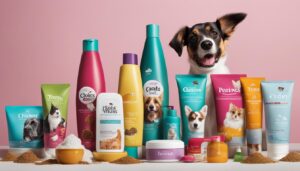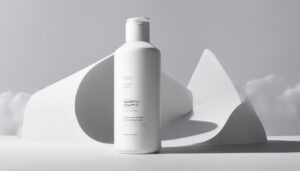Private label skincare products have become increasingly popular in the booming skincare industry. If you’re considering launching your own skincare brand, understanding the concept of private label skincare, its benefits, and the importance of effective marketing strategies is crucial for the success of your brand.
Key Takeaways:
- Skincare private label brands offer customization options and affordability.
- Private label skincare marketing helps build brand awareness and loyalty.
- Market analysis is essential for understanding your target audience and the competitive landscape.
- Developing a marketing strategy involves creating a brand identity and leveraging social media.
- Measuring the success of your marketing strategy is vital to track performance.
Understanding Private Label Skincare
Private label skincare has become increasingly popular in the skincare industry. It refers to skincare products manufactured by a third-party manufacturer but sold under a retailer’s brand name. This arrangement offers several advantages to retailers, including customization options, affordability, and the ability to establish a unique brand identity.
With private label skincare, retailers have the flexibility to choose from a variety of skincare formulas and packaging options. They can customize the products to meet their target audience’s specific needs and preferences, ensuring that their brand stands out in a crowded market. This level of customization also allows retailers to maintain control over product quality and pricing.
Furthermore, private label skincare provides a cost-effective solution for retailers who want to enter the skincare market without investing in extensive product development and manufacturing capabilities. By partnering with a reputable private label skincare manufacturer, retailers can leverage the manufacturer’s expertise and resources to bring high-quality skincare products to market quickly and efficiently.
Why choose private label skincare?
“Private label skincare offers retailers the opportunity to create their own unique brand identity and provide exclusive products to their customers. It allows them to differentiate themselves in a competitive market and build customer loyalty.”
Understanding private label skincare is essential for retailers looking to enter the skincare market or expand their product offerings. By taking advantage of the customization options and affordability that private label skincare offers, retailers can establish a strong brand presence and meet the needs of their target audience effectively.
| Advantages of Private Label Skincare |
|---|
| Customization options |
| Affordability |
| Establishing a unique brand identity |
| Control over product quality and pricing |
| Access to expertise and resources of private label skincare manufacturers |
Benefits of Private Label Skincare Marketing
Private label skincare marketing offers numerous benefits for retailers looking to establish and grow their brand. By leveraging effective marketing strategies, retailers can gain a competitive edge in the market and drive sales. Here are some key benefits of private label skincare marketing:
1. Building Brand Awareness and Loyalty
Through marketing efforts such as social media campaigns, email marketing, and content creation, retailers can raise awareness about their private label skincare brand. By consistently engaging with their target audience and delivering valuable content, retailers can build brand loyalty and credibility.
2. Offering Exclusive Products
Private label skincare marketing allows retailers to create unique products tailored to their target audience’s specific needs and preferences. By offering exclusive formulations, retailers can differentiate themselves from competitors and attract customers seeking specialized solutions.
3. Controlling Pricing and Margins
With private label skincare marketing, retailers have control over pricing and margins. This enables them to set competitive prices while maintaining profitability. By strategically pricing their products, retailers can attract consumers looking for quality skincare products at affordable prices.
4. Increasing Sales Volume and Revenue
An effective private label skincare marketing strategy can lead to increased sales volume and revenue. By leveraging various marketing channels, retailers can reach a wider audience and generate more sales. Moreover, by continuously analyzing marketing campaigns and customer feedback, retailers can refine their strategy and further boost sales performance.
Overall, private label skincare marketing offers retailers the opportunity to build a strong brand, generate customer loyalty, and drive sales growth. By implementing effective marketing strategies and understanding their target audience, retailers can position themselves for success in the competitive skincare industry.
Market Analysis for Private Label Skincare
Before developing a marketing strategy for your private label skincare brand, conducting a comprehensive market analysis is essential. This analysis will provide valuable insights into your target audience, market size, growth potential, and competitive landscape. By understanding these key factors, you can strategically position your brand and make informed decisions to drive your business forward.
To begin the market analysis process, it is important to identify your target audience. Who are the ideal customers for your private label skincare products? Conduct research to understand their demographics, preferences, needs, and purchasing behavior. This will help you tailor your marketing messages and product offerings to effectively reach and engage your target audience.
Additionally, analyzing the market size and growth potential of the private label skincare industry will give you a clear understanding of the opportunities available. Consider factors such as market trends, demand for skincare products, and projected growth rates. This information will guide your marketing efforts and allow you to capitalize on emerging opportunities.
Competitive analysis is another crucial aspect of market analysis. Identify and evaluate your competitors in the private label skincare market. Analyze their product offerings, pricing strategies, marketing tactics, and brand positioning. Understanding your competition will help you differentiate your brand and develop unique selling points that resonate with your target audience.
Market Analysis Checklist:
- Identify your target audience and understand their demographics, preferences, and purchasing behavior.
- Analyze the market size and growth potential of the private label skincare industry.
- Conduct a competitive analysis to identify your competitors and evaluate their strategies.
By conducting a thorough market analysis, you will gain valuable insights that will inform your marketing strategy and set your private label skincare brand up for success in a competitive market.
| Market Analysis Checklist | |
|---|---|
| Identify your target audience | |
| Understand their demographics, preferences, and purchasing behavior | |
| Analyze the market size and growth potential of the private label skincare industry | |
| Conduct a competitive analysis | |
| Evaluate your competitors’ strategies |
Developing a Private Label Skincare Marketing Strategy
Creating a comprehensive marketing strategy is essential for the success of your private label skincare brand. A well-planned strategy will help you reach your target audience, establish brand identity, and ultimately drive sales and revenue. Here are some key steps to consider when developing your private label skincare marketing strategy:
Identify Your Target Audience
Understanding your target audience is crucial for tailoring your marketing efforts effectively. Conduct market research to gather insights about their demographics, preferences, and purchasing behaviors. This information will help you create targeted messaging and promotional campaigns that resonate with your audience.
Create a Brand Identity and Product Positioning
Develop a unique brand identity that sets your private label skincare products apart from the competition. Determine your brand’s core values, mission, and key differentiators. This will guide your product positioning and messaging, helping you communicate the benefits and value of your skincare offerings to potential customers.
Develop a Content Marketing Plan
Content marketing plays a crucial role in building brand awareness, engaging your audience, and positioning yourself as an industry authority. Develop a content marketing plan that includes blog posts, social media content, videos, and other valuable resources that educate and engage your target audience. Consistency and relevance are key to successful content marketing.
Leverage Social Media for Marketing
Social media platforms provide a powerful avenue for connecting with your target audience and promoting your private label skincare brand. Identify the social media channels that are most popular among your target audience and develop a strategic plan to engage with them. Share valuable content, run promotional campaigns, and interact with your followers to build brand loyalty and attract new customers.
By following these steps, you can develop a strong and effective marketing strategy for your private label skincare brand. Remember to regularly evaluate and adjust your strategy based on the feedback and insights you gather along the way to ensure continued success.
Measuring the Success of Your Private Label Skincare Marketing Strategy
Measuring the success of your private label skincare marketing strategy is essential to gauge its effectiveness and make data-driven decisions. By tracking various metrics, you can gain valuable insights into customer engagement, sales performance, website traffic, and social media reach. These insights enable you to optimize your marketing efforts, identify areas for improvement, and ultimately drive the success of your private label skincare brand.
One of the key metrics to monitor is sales volume. By analyzing your sales data, you can determine the impact of your marketing activities on product performance. Look for any significant increases or decreases in sales, identify the channels that drive the most conversions, and assess the effectiveness of different marketing campaigns.
Customer engagement is another crucial metric to consider. Tracking metrics such as website visits, time spent on site, and bounce rate can help you understand how well your marketing efforts are engaging your target audience. Additionally, monitoring social media metrics like likes, shares, comments, and follower growth can provide insights into audience interaction and brand loyalty.
Website traffic is an important indicator of brand visibility and online presence. By analyzing website analytics, you can identify which marketing channels generate the most traffic and optimize your strategy accordingly. Pay attention to metrics such as page views, unique visitors, and referral sources to gain a comprehensive understanding of your online performance.
Evaluating the success of your marketing strategy
While tracking these metrics is valuable, it’s equally important to evaluate the overall success of your marketing strategy. Look for trends and patterns in the data, compare your performance to industry benchmarks, and identify areas where you can make improvements. Regularly reviewing and analyzing your marketing data will help you make informed decisions, optimize your strategy, and drive the success of your private label skincare brand.
Private Label Skincare Marketing Trends to Watch
In the ever-evolving skincare industry, staying on top of the latest marketing trends is essential for private label skincare brands. By embracing these trends, brands can connect with their target audience, differentiate themselves from the competition, and drive business growth. Here are some of the top private label skincare marketing trends to watch:
Sustainability
Consumers are increasingly prioritizing sustainability and environmental consciousness. To resonate with eco-conscious consumers, private label skincare brands can focus on offering sustainable packaging options, using natural and organic ingredients, and adopting eco-friendly manufacturing practices. By aligning with sustainability, brands can appeal to a growing segment of socially and environmentally conscious consumers.
Natural Ingredients
The demand for skincare products with natural ingredients continues to rise. Consumers are seeking clean and transparent formulations that are free from harmful chemicals. Private label skincare brands can take advantage of this trend by developing products that highlight the use of natural ingredients and by clearly communicating the benefits of these ingredients to consumers.
Personalized Solutions
Personalization is becoming a key driver in the skincare industry. Consumers are looking for products that cater to their specific needs and preferences. Private label skincare brands can offer personalized solutions by providing customization options such as tailored formulations, skincare routines, or even personalized packaging. By giving consumers the ability to customize their skincare experience, brands can build strong customer loyalty and increase customer satisfaction.
| Trend | Description |
|---|---|
| Sustainability | Brands focus on offering sustainable packaging options, natural ingredients, and eco-friendly manufacturing practices. |
| Natural Ingredients | Brands develop products that highlight the use of natural ingredients and communicate their benefits to consumers. |
| Personalized Solutions | Brands offer customization options such as tailored formulations, skincare routines, and personalized packaging. |
By keeping a finger on the pulse of these private label skincare marketing trends, brands can adapt their strategies and better connect with their target audience. Whether it’s through sustainable practices, natural ingredients, or personalized solutions, embracing these trends can help brands stand out in a crowded market and drive business success.
Importance of Partnering with a Quality Private Label Skincare Manufacturer
When it comes to developing and launching your private label skincare brand, partnering with a quality manufacturer is key to your success. A trusted skincare manufacturer not only ensures that your products are formulated with the highest quality ingredients, but also provides expertise in product development, packaging, regulatory compliance, pricing, and turnaround times.
By collaborating with a reputable private label skincare manufacturer, you can benefit from their vast industry knowledge and experience. They understand the latest market trends, consumer preferences, and regulatory requirements, helping you create products that meet the highest standards and resonate with your target audience.
Moreover, working with a quality manufacturer allows you to focus on building your brand and marketing strategies, as they take care of the manufacturing process. This saves you time and effort, ensuring that your products are consistently produced to the highest standards and delivered on time to meet customer demands.
The Advantages of Partnering with a Quality Private Label Skincare Manufacturer
- Expertise in product development and formulation
- Access to a wide range of high-quality ingredients
- Efficient packaging solutions that align with your brand identity
- Compliance with regulatory requirements and guidelines
- Competitive pricing and cost-effective manufacturing
- Quick turnaround times to meet market demands
In the highly competitive skincare industry, working with a quality private label skincare manufacturer gives you a competitive edge. Their expertise, resources, and commitment to quality are invaluable in helping you create a successful and reputable skincare brand.
To summarize, partnering with a quality private label skincare manufacturer is essential for ensuring the success of your brand. They provide the necessary expertise, resources, and support to develop and manufacture high-quality skincare products, allowing you to focus on marketing and building your brand. By choosing a trusted manufacturer, you can deliver exceptional products that meet customer expectations and stand out in the market.
| Advantages | Benefits |
|---|---|
| Expertise in product development and formulation | Ensures high-quality formulations |
| Access to a wide range of high-quality ingredients | Allows for diverse and effective product formulations |
| Efficient packaging solutions that align with your brand identity | Enhances product presentation and brand recognition |
| Compliance with regulatory requirements and guidelines | Ensures legal and safe products |
| Competitive pricing and cost-effective manufacturing | Maximizes profitability |
| Quick turnaround times to meet market demands | Ensures timely product availability |
Conclusion
In conclusion, implementing effective marketing strategies is vital for the success of your skincare private label brand. By building a strong brand identity and understanding your target audience, you can create a unique selling proposition that sets you apart from competitors.
Developing a comprehensive marketing strategy that includes content marketing and social media engagement can help you reach and connect with your target customers. It’s crucial to stay updated with the latest trends in private label skincare marketing, such as sustainability and natural ingredients, to meet the evolving demands of consumers.
Additionally, partnering with a quality private label skincare manufacturer is essential. They can ensure product development, formulation, and packaging meet the highest standards, while also navigating regulatory compliance. Working with a trusted manufacturing partner can elevate your brand and enhance its potential for success.
FAQ
What is private label skincare?
Private label skincare refers to skincare products manufactured by a third-party manufacturer and sold under a retailer’s brand name.
What are the benefits of private label skincare marketing?
Private label skincare marketing allows retailers to build brand awareness and loyalty, offer exclusive products, control pricing and margins, and increase sales volume and revenue.
Why is market analysis important for private label skincare?
Conducting market analysis helps understand the target audience, market size, growth potential, and competitive landscape.
How can I develop a private label skincare marketing strategy?
Developing a marketing strategy involves identifying the target audience, creating a brand identity and product positioning, developing a content marketing plan, and leveraging social media for marketing.
How do I measure the success of my private label skincare marketing strategy?
Measuring the success of a marketing strategy involves tracking various metrics such as sales volume, customer engagement, website traffic, and social media metrics.
What are the latest trends in private label skincare marketing?
Staying up to date with the latest trends in private label skincare marketing, such as sustainability, natural ingredients, and personalized solutions, is important for staying competitive.
Why is partnering with a quality private label skincare manufacturer important?
Partnering with a quality private label skincare manufacturer is crucial for product development, formulation, packaging, regulatory compliance, pricing, and turnaround times.
Shay labs is here to help!
Shay Labs is a trusted name in the cosmetic manufacturing industry. With years of experience and a strong commitment to quality, Shay Labs offers a wide range of private label manufacturing services for beauty, skin, hair, pet, and personal care products. Their state-of-the-art facilities and dedicated team ensure that every product is created with the utmost care and attention to detail. Contact Shay Labs today to discuss your next project. We’re here to help.
Recommended Reading
Guide: How to Find and Vet a Mouthwash Private Label Supplier





